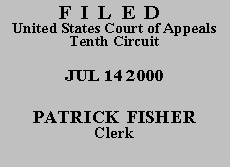

| DENNIS BROCK,
Plaintiff-Appellant, v. KENNETH S. APFEL, Commissioner, Social Security Administration, Defendant-Appellee. |
|
Plaintiff Dennis Brock appeals from the denial of his claim for social security disability and supplemental security income benefits. We have jurisdiction under 28 U.S.C. § 1291 and 42 U.S.C. § 405(g). We review the agency's decision on the whole record to determine only whether the factual findings are supported by substantial evidence and the correct legal standards were applied. See Goatcher v. United States Dep't of Health & Human Servs., 52 F.3d 288, 289 (10th Cir. 1995). We reverse and remand for additional proceedings.
This is claimant's second application for benefits. He filed his first application, without a representative, on September 14, 1992, alleging a disability beginning on August 26, 1991. The Commissioner asserts that this first application was denied by the agency on July 16, 1993, and not pursued further by claimant. See Appellee's Br. at 13. The agency's decision is not in the record.
Claimant filed the current application for benefits, represented by counsel, on December 7, 1993, alleging that he became disabled on September 10, 1991. After a hearing, the administrative law judge (ALJ) issued a decision on January 23, 1995, that claimant was not disabled. See Appellant's App., Vol. II at 12-20. The Appeals Council denied review on September 27, 1995, see id. at 6-7, and claimant filed suit in district court. The Commissioner explains that while a decision there was pending, the agency moved to remand the case for additional vocational evidence. See Appellee's Br. at 14 n.1. After a rehearing, the ALJ issued a decision on February 28, 1997, again denying benefits. See Appellant's App., Vol. II at 363-70. The Appeals Council denied review, see id. at 346-47, making this the agency's final decision.
The ALJ expressly found in his January 23, 1995 decision that there was no reason to reopen claimant's first application for benefits. See id. at 15. Absent a colorable constitutional claim not present here, this court has no jurisdiction to review that determination. See Califano v. Sanders, 430 U.S. 99, 107-09 (1977). As a result, the doctrine of res judicata bars claimant's request for benefits for the adjudicated period, that is, on or before July 16, 1993. See Lester v. Chater, 81 F.3d 821, 827 (9th Cir. 1996).
Contrary to the agency's assertion, however, the medical evidence from before that date is not irrelevant, but is relevant as a backdrop to the evidence filed subsequently. See Bladow v. Apfel, 205 F.3d 356, 360 n.7 (8th Cir. 2000). There is nothing in the record before us to show that claimant's first application received a hearing before an ALJ; as a result, there is nothing to show that any specific findings about claimant's many alleged impairments were made in the first denial. For this reason, we need not consider whether the parties are bound, under the doctrine of collateral estoppel, by any finding made in the first denial other than the ultimate finding of nondisability. Cf. Gavin v. Heckler, 811 F.2d 1195, 1199-1200 (8th Cir. 1987) (holding, based on 42 U.S.C. § 405(h), that agency findings made after a hearing are binding on the parties). It follows that the ALJ must consider all of the medical evidence, even that from before the first denial, in order to validly determine the existence and extent of each of claimant's alleged impairments in this current application for benefits.
Claimant argues on appeal that the ALJ's hypothetical questions to the vocational expert did not include all of his impairments, specifically frozen left shoulder, chest pain under stress, problems with concentration and memory, the need to lay down for pain, and hearing loss. Nothing in either of the ALJ's decisions demonstrates that he considered any of claimant's medical evidence from before the agency's first denial of benefits. See Appellant's App., Vol. II at 15-20, 363-70. Indeed, the ALJ stated in his January 23, 1995 decision that "[t]he beginning date for the period under consideration . . . is July 17, 1993." Id. at 15. He stated in both of his decisions that he disregarded medical evidence "relat[ing] to a time not covered by the claim." Id. at 17, 365. We conclude that the ALJ erred by omitting the medical evidence from before July 17, 1993. We therefore reverse and remand for the agency to assess claimant's application for benefits in light of all of the medical evidence.
The judgment of the United States District Court for the Eastern District of Oklahoma is REVERSED and the case is REMANDED with directions to remand to the agency for additional proceedings.
Entered for the Court
Circuit Judge
*. This order and judgment is not binding precedent, except under the doctrines of law of the case, res judicata, and collateral estoppel. The court generally disfavors the citation of orders and judgments; nevertheless, an order and judgment may be cited under the terms and conditions of 10th Cir. R. 36.3.